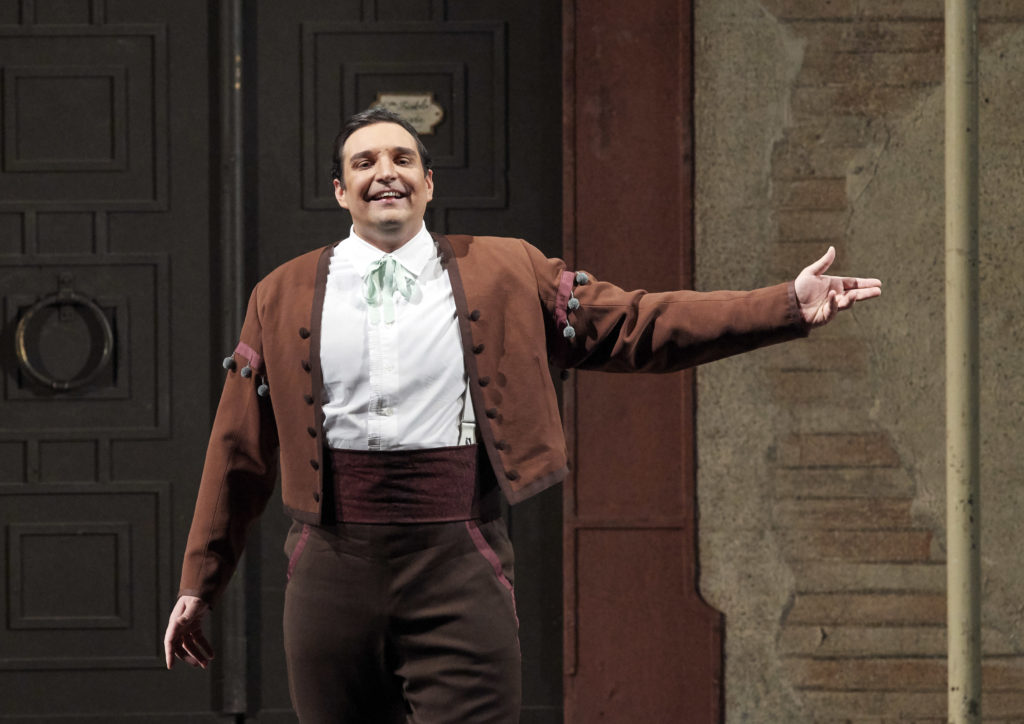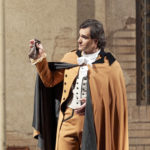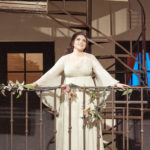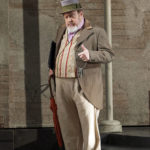 I’ve seen Rossini’s Barber of Seville six times at Vienna State Opera since 2010. There have been 77 performances of this classic Günther Rennert production in the last decade, a staggering 433 in total. Why is it, Rossini’s opera, still so popular? Firstly, it’s comedy, really farce, the plot fiendishly clever, in its twists and turns, but engineered like clockwork. It turns on the scheming Count Almaviva- he of Mozart’s Figaro – pursuing the beauty Rosina. He’s aided and abetted by the Barber, an old accomplice, Almaviva disguising himself first as a soldier, (then Act 2), as a music teacher to get into Dr Bartolo’s house, Bartolo being her ‘ward’, allegedly protecting her, but proposing to ‘marry’ her himself. If this sounds offensive in our MeToo times, Rosina the object of lechering men, is actually in love with Almaviva’s ‘Lindoro’, and no pushover.
I’ve seen Rossini’s Barber of Seville six times at Vienna State Opera since 2010. There have been 77 performances of this classic Günther Rennert production in the last decade, a staggering 433 in total. Why is it, Rossini’s opera, still so popular? Firstly, it’s comedy, really farce, the plot fiendishly clever, in its twists and turns, but engineered like clockwork. It turns on the scheming Count Almaviva- he of Mozart’s Figaro – pursuing the beauty Rosina. He’s aided and abetted by the Barber, an old accomplice, Almaviva disguising himself first as a soldier, (then Act 2), as a music teacher to get into Dr Bartolo’s house, Bartolo being her ‘ward’, allegedly protecting her, but proposing to ‘marry’ her himself. If this sounds offensive in our MeToo times, Rosina the object of lechering men, is actually in love with Almaviva’s ‘Lindoro’, and no pushover.
The genius of Rossini is that, using (Cesare Serbini’s) brilliant text, its memorable characters based on Beaumarchais’s classic play, Rossini’s raises this comedy to an even higher level. Rossini’s music, an ironic commentary on the dramatic plot and its characters, drives the action forward like an engine. In lower gear for the ‘recitative’ conversations, to frenzied climaxes of high-speed confusion. Comedy is about split-second timing. Rossini’s famous crescendo builds up musical tension, as in Figaro’s cavatina describing his ever-demanding clients, his words ever-faster. And Vienna State Opera Orchestra are masters of this music- served by a roster of Rossini specialists- tonight’s Guillermo Garcia Calvo kept that irresistible Rossini rhythm moving.
Vienna’s classic Rennert production, after 433 performances, might be considered ‘old’. But this reproduction (Alfred Siercke) of a Seville village is a marvel of detail, authentically fascinating. The stage, brilliantly lit, is a masterpiece in creams, gold, light woods, on three levels, with sliding shutters and panels, within a courtyard, with brickwork portals either side of stage. The cleverness of the set is the central spiral staircase, allowing the characters quick change of scenes, to reappear in unexpected places: like a game of ‘snakes and ladders’. It should be preserved like a world heritage sight.
No cast is perfect, nor was tonight’s – a fine balance of voices in inappropriately matched characters. Vienna maintain a very high ensemble standard, even in the smaller roles. But the star, as should be in the title role, was Adam Plachetka’s Figaro. Plachetka’s Figaro is big, virile, bursting with energy, his richly timbered baritone well experienced in the role. Superlatively accompanied by Calvo’s Vienna players, Plachetka powerful, but nimble, really engaged with the audience. Beaming with mirth, in Figaro’s signature Largo al factotum, he does justice to this well-worn classic. Figaro, Figaro… What a frenzy; one at a time. Up and down, fast as lightning. Fortune will always smile on you, Factotum of the city. (The audience cheered, as I did.)
 Pavel Kolgatin’s Count Almaviva is, by contrast, slight of stature. His is a very fine tenor, but here a little characterless for this lecher who’s already had his share of sexual escapades. He approaches Figaro. Let me explain, I saw a beauty at the Prado (Madrid) – a reminder this is Spain. Figaro, richly rewarded, tells of Bartolo, ‘I happen to be his barber, and she’s his ward.’
Pavel Kolgatin’s Count Almaviva is, by contrast, slight of stature. His is a very fine tenor, but here a little characterless for this lecher who’s already had his share of sexual escapades. He approaches Figaro. Let me explain, I saw a beauty at the Prado (Madrid) – a reminder this is Spain. Figaro, richly rewarded, tells of Bartolo, ‘I happen to be his barber, and she’s his ward.’
Tara Erraught, as Rosina- the target of this scheming- seemed a little plump for a ‘young girl’: she’s a mature woman. But her mezzo- soprano is both exquisite and powerful.
Paulo Rumetz’s bass-baritone is, vocally, perfectly cast as Dr.Bartolo. But with his white hair, in a red velvet fez, showing his paunch, more like a grandfather. But this is a stereotypical comic role. Rumetz’s Bartolo has the UGH factor. (Sorry.) ‘A pompous master never has a penny’, so Figaro describes him. But he’s no fool, susses out Figaro/Almaviva’s plot, and (Act 2), locks the girl up.
Almaviva’s opening scene, serenades Rosina from beneath her balcony, (Ecco ridente il cielo), accompanied by street musicians he hires. Later, Act 1, in aria reminiscent of later Donizetti, he sings, accompanied by Figaro on guitar, with a simplicity, albeit feigned, but moving honesty: ‘From dawn to dusk I speak only of you.’ (Kolgatin still lacks charisma.) Rosina replies, ‘I am a little girl, respectable, sweet, and innocent.’ That she is not. But, the Irish beauty, all woman, Erraught sings displaying thrilling coloratura. 
She’s impressive, charming, in Rosina’s aria,(Una voce poco fa), enthusing about the young Cavalier ‘Lindoro’, she’s writing to. Bartolo, Rumetz, perfectly irritable and testy, noticing a sheet of his paper is missing: ‘If you want to make a fool of me, you’ll have to do better than that.’ (She makes all kinds of excuses.)
In Figaro’s plan for Almaviva to be requisitioned, Kolgatin’s drunken soldier creates a scene; and loudly demanding accommodation, manages to get through to Rosina. Kolgatin’s pissed soldier is not that funny, rather over-acted. Bartolo calls the police, the joke is that Bartolo (as a Doctor) is exempt from billeting soldiers. Under arrest, never! The military officer (Daniel Lokos), in a splendid green uniform with a plume – stiff, tall- is perfect in the farce. Almaviva shows his papers, and released. Breathtaking climax, in the chaos, with soldiers ransacking Bartoli’s upper rooms, armed with booty, leaning over the balconies. Rossini ends the Act in a massive crescendo of confusion.
Kolgatin is better, reappearing (Act 2), as a stand-in – singing off-key!- for Basilio, Rosina’s music teacher. Bartolo thinks he knows his face, and insists on being present at Rosina’s ‘music lesson.’ It’s genuinely funny, Rosina and music teacher ‘Alfonso’ flirting beneath Bartolo’s ever-watchful eye. Her songs have a subversive subtext. ‘Against a heart that’s inflamed, even a tyrant cannot prevail.’ Rosina’s love rhetoric, ‘dearest I trust you’, is aimed at her ‘piano teacher’. But Bartolo, Rumetz preening himself, is standing centre-stage, the vain old fool, as if she were addressing him.  Randy Rumetz flirts openly until Figaro breaks him out of his reverie, forcibly offering to shave him, to distract him. Plachetka is brilliant at bombarding Bartolo with his barber-room gossip, while Almaviva/Lindoro and Rosina plan elopement.
Randy Rumetz flirts openly until Figaro breaks him out of his reverie, forcibly offering to shave him, to distract him. Plachetka is brilliant at bombarding Bartolo with his barber-room gossip, while Almaviva/Lindoro and Rosina plan elopement.
Basilio, the real music teacher, reappears- the splendid bass Jongmin Park- who was sent away to nurse his cold. (Buona sera.) In the farce, Figaro tugs at Bartolo, entangled in a long towel, to keep him away from the lovers. The housekeeper Marzellina a blonde Ildiko Raimondi) in a stand-out cameo, sings of foolish old men marrying young women: No peace! The old man wants a wife, Rosina wants a husband: What is this thing called love?
In the plot, Bartolo, who’s got hold of Rosina’s letter to Lindoro, poisons her against him. What a cruel fate! She thinks he’s pretended love to turn her over to Almaviva. So Rosina, out of spite, agrees to marry Bartolo.
In Rossini’s intermezzo, pizzicato strings describe the storm, as ‘Lindoro’ and Rosina, elope from her bedroom, assisted by Figaro, (escape-ladder removed). Oh sweet bond of love! While Bartolo’s calling the police, the villa’s facades unrolls revealing the magnificent drawing room wedding reception. Figaro bribes Bartolo’s own lawyer- and pistols Basilio to witness- Rosina’s marriage, to Almaviva, finally revealed. Kolgatin kneels, begging forgiveness.
Oh, what unexpected joy! He, himself, Figaro, look what my scheming has achieved, boasts Plachetka. No hack writer can begin to do justice to Rossini’s masterpiece, which even Beethoven envied. See Vienna’s marvelous, classic production, before they change the sets for some minimalist, modern concept. © P.R. 7.1.2020
Photos: Adam Plachetka (Figaro); Pavel Kolgatin (Count Almaviva); Tara Erraught (Rosina); Paulo Rumetz (Dr.Bartolo); Featured image: Pavel Kolgatin (Almaviva) and Tara Erraught (Rosina)
© Wiener Staatsoper/ Michael Pöhn
